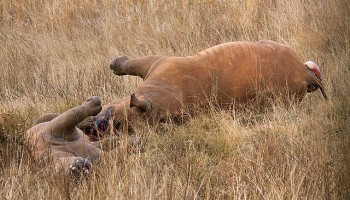Vaquita is the world’s smallest and most endangered cetacean. According to the International Committee to the Recovery of the Vaquita (CIRVA) the species is close to extinction.
Poachers tossed Molotov cocktails, anchors and Tabasco sauce at a Sea Shepherd Conservation Society (SSCS) patrol boat in January, when the activists were trying to protect the vaquitas.
The poachers' nearly 35 skiffs carried gill nets, a type of fishing net that snare and thus drown the vaquitas, who like dolphins and porpoises are mammals and need to break the surface to breath.
The vaquitas are not the gangs’ actual targets. They are collateral damage as poachers catch and then smuggle totoaba, a fish whose swim bladders are prized in Traditional Chinese Medicine (TCM).
Clare Perry, Ocean Campaigns Leader at the Environmental Investigation Agency, echoed CIRVA’s warning, adding that “the organised criminal networks trafficking totoaba swim bladders from Mexico to China are responsible for the illegal fishing nets driving the vaquita to extinction.”
“Unless action is taken now, the species will be lost within a few months or years during your administration,” CIRVA said in a letter addressed to Mexico’s Secretaries of Environment and Natural Resources and Agriculture and Rural Development.
“Unless Mexico gets serious about enforcement and works with China and key transit countries to dismantle those networks, there is no hope for the remaining vaquita,” Perry continued.
Scientists have known for decades that the vaquita are a rare and vulnerable species. The porpoises presently have a range of approximately 4,000 square kilometers, but are mostly concentrated within some 2,235 square kilometers, according to the Cetacean Specialist Group.
The International Union for Conservation of Nature (IUCN) red-listed the vaquita as Vulnerable in 1978, Endangered in 1990 and Critically Endangered in 1996. In 2007 the IUCN Director-General implored the President of Mexico “to ensure that all appropriate steps are taken immediately to prevent the vaquita, a national treasure of Mexico, from going extinct.”
CIRVA was established by the Mexican Ministry of Environment, Natural Resources and Fisheries in 1996 to develop a recovery plan specifically for the endangered vaquita.
Mexico banned the use of most gillnets in the vaquita’s habitat in 2017, but enforcement remains weak, according to EIA. The population dropped 50 percent in 2018.
The Sea of Cortez, as the Gulf of California is also known, is 62,000 square miles of dazzling turquoise and a UNESCO World Heritage site. With nearly 900 unique species of fish, it is also one of the world’s most diverse seas, according to National Geographic.
But Mexico’s prized sea could lose another species within the month if proper, swift action is not taken, CIRVA says.
Hope is not lost entirely, however; the vaquitas are still producing calves.
“We have to come up with solutions that buy time. This is not a numbers game. It’s a game of time,” conservationist and author Brooke Bessesen recently told the New York Times.






